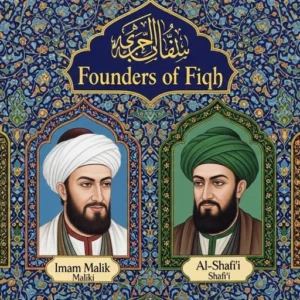Overview
Fiqh, or Islamic jurisprudence, is one of the most essential sciences of Islam.
It shapes how Muslims live, worship, and interact with others through rulings derived from the Qur’an and Sunnah.
Classical scholars organized this knowledge into a framework called “The Ten Principles of Fiqh & 5 Principles of Fiqh .”
These principles:
-
Form the foundation for every student of Islamic knowledge.
-
Guide Muslims in structured learning.
-
Remain vital today, especially for Muslims in the UK facing challenges in finance, healthcare, and family law.
Mastering them provides a clear path to deeper understanding and practice of Islam.
The Ten Principles of Fiqh Explained:
The Ten Principles of Fiqh are a framework used by scholars to introduce and structure any Islamic science. When applied to Fiqh Islamic Jurisprudence, they allow Muslims to see not only the rulings but also the logic, sources, and scope of those rulings.
1. Definition of Fiqh:
Linguistically, the Arabic word fiqh (فقه) means “deep understanding” or “profound comprehension.”
Technically, Fiqh Islamic Jurisprudence is defined as:
“Knowledge of practical Shari’ah rulings, derived from detailed evidences.”
This means Fiqh focuses on practical rulings (like prayer, fasting, contracts) based on proof from Qur’an, Sunnah, consensus (ijma’), and reasoning (qiyas).
Breakdown of the definition:
- Knowledge: Understanding, not just memorization.
- Shari’ah Rulings: Commands from Allah, not man-made laws.
- Practical: Focuses on external actions, not internal beliefs.
- Derived: Extracted from evidence by scholars.
2. Subject of Fiqh:
The subject matter of Fiqh is the actions of the mukallaf (accountable Muslim). These actions are classified into:
| Action Type | Ruling Type | Example |
| Worship | Obligatory | Five daily prayers |
| Transactions | Permissible/Prohibited | Buying vs. selling haram goods |
| Family Law | Recommended/Disliked | Marriage vs. unnecessary divorce |
Fiqh answers the question: What is the ruling of this action?
3. Purpose of Studying Fiqh:
Fiqh is the manual for Muslim life. Its purposes include:
- Guiding proper worship and dealings.
- Preventing sin through clarity.
- Offering solutions for modern challenges.
- Promoting justice and mercy in society.
In the UK, this extends to areas like Islamic finance, halal food standards, healthcare ethics, and family law.
4. Virtue of the Science of Fiqh:
The Prophet Muhammad (peace be upon him) said:
“If Allah intends good for someone, He gives him understanding of the religion.” (Bukhari & Muslim)
Why Fiqh is virtuous:
- It links knowledge to daily practice.
- It prevents blind following and opens clarity.
- It ensures Muslims live by Allah’s guidance in every situation.
Many scholars preferred Fiqh over other sciences because of its direct impact on life.
5. Relation to Other Sciences:
Fiqh interacts with multiple sciences:
- Usul al-Fiqh: Methodology for extracting rulings.
- Aqidah: Belief system (batin) while Fiqh deals with actions (zahir).
- Hadith & Tafsir: Primary sources for rulings.
6. Founder of Fiqh:
While Allah is the ultimate legislator, early scholars organized and formalized Fiqh:
- Imam Abu Hanifa (Hanafi school).
- Imam Malik (Maliki school).
- Imam al-Shafi’i (Shafi’i school).
- Imam Ahmad ibn Hanbal (Hanbali school).
Each school (madhhab) followed the same sources (Quran Sunnah) but with nuanced approaches.
7. Name of the Science:
Fiqh is also called:
- Science of Halal and Haram.
- Practical Islamic Law.
- Applied Shari’ah.
It focuses on external practice, unlike ‘Ilm al-Kalam which focuses on theology.
8. Sources of Fiqh:
Fiqh rulings come from both primary and secondary sources:
| Source | Explanation |
| Quran | The divine foundation of rulings. |
| Sunnah | Sayings/actions of the Prophet ﷺ. |
| Ijma’ | Scholarly consensus. |
| Qiyas | Analogy based on established rulings. |
| Istihsan | Juristic preference (in some madhhabs). |
➡️ This includes what scholars call Fiqh Sunnah, where rulings directly apply Sunnah practices in daily life.
9. Ruling on Studying Fiqh:
- Fard ‘Ayn (Individual obligation): For essentials like prayer, purification, fasting.
- Fard Kifayah (Communal obligation): For complex rulings like judiciary, inheritance, finance.
Thus, every Muslim must study what is personally required, while specialists ensure the community is covered.
10. Issues of Fiqh:
Fiqh is divided into categories:
| Category | Examples |
| Worship (Ibadat) | Prayer, fasting, zakah, hajj. |
| Transactions | Buying, selling, leasing. |
| Family Law | Marriage, divorce, custody. |
| Criminal Law | Theft, murder, punishments. |
| Judicial Law | Witnesses, contracts, evidence. |
👉 Build your confidence in practicing Islam — Join our Islamic Studies course today.
Prefer to talk first? Message us on WhatsApp
Practical Examples of the 5 Principles of Fiqh in Daily UK Life
These examples show how the 5 principles of fiqh guide modern Muslim life.
-
Intentions: Choosing halal income, sincere worship, ethical study
-
Certainty vs doubt: Wudu doubts, prayer doubts, food doubts
-
Hardship brings ease: Shortening prayers during exams, workload, or travel
-
Removing harm: Avoiding harmful debt, toxic relationships, or unsafe workplaces
-
Custom: UK contracts, workplace expectations, communication style
Practical Applications of Fiqh in Modern Life:
Muslims in the UK face unique challenges where Fiqh is essential:
- Islamic Finance: Mortgages, interest-free banking, zakah on investments.
- Family Law: Marriages, divorce recognition under UK law.
- Healthcare: Medical ethics, organ donation, end-of-life care.
- Halal Food: Certification, restaurants, supermarkets.
- Community Life: Mosque administration, Islamic charities.
This shows Fiqh is not ancient theory but living guidance.
Why Study the Ten Principles of Fiqh?
Understanding these principles helps:
- Beginners build a foundation.
- Advanced learners refine analytical skills.
- Every Muslim appreciate the structure of Islamic law.
For Muslims in the UK, this structured study makes faith relevant in modern contexts.
How Islamic Studies Help You Understand the 5 Principles of Fiqh
Studying Islamic Studies gives structure and clarity when learning the 5 principles of fiqh.
-
Links each principle to Qur’an and Sunnah in practical ways
-
Shows how scholars apply Fiqh Principles to new issues
-
Helps Muslims apply the principles to finance, food, family, and work in the UK
-
Makes it easier to Learn Islamic Studies Online with guided lessons
-
Provides access to an Islamic Studies Teacher Online for deeper understanding
-
Strengthens Seeking Knowledge in Islam as part of daily growth
Start Your Journey in Islamic Studies with Us
At Quranic Mind we don’t just teach theory — we help you live Islam in your daily life.
- 📖 Learn Islamic Studies step by step with certified scholars.
- 🌍 Designed for Muslims in the UK balancing modern life with faith.
- 🕒 Flexible schedules for families, students, and professionals.
- 🎓 1-on-1 guidance with expert teachers from Al-Azhar.
- 🎁 Two free trial classes so you can experience the difference.
👉 Build your confidence in practicing Islam — Join our Islamic Studies course today.
Learn the 5 Principles of Fiqh with Structured Guidance
Mastering the 5 principles of fiqh becomes easier with a guided Islamic Studies Course Online.
-
Step-by-step lessons with Azhar-trained teachers
-
Real-life application exercises
-
Weekly Q&A with an Islamic Studies Teacher Online
-
Designed for busy Muslims in the UK
👉 Learn Islamic Studies Online — with two free trial classes
FAQ: Ten Principles of Fiqh:
What is the meaning of Fiqh in Islam?
Fiqh means “understanding.” In Islamic law, it refers to knowledge of Shari’ah rulings related to actions.
Are there only 10 principles of Fiqh?
The “Ten Principles” are a framework for learning, not rulings themselves.
What’s the difference between Fiqh and Usul al-Fiqh?
Fiqh = rulings. Usul al-Fiqh = methodology of deriving rulings.
Do I need to learn all 10 principles before studying Fiqh?
Not required, but they provide structure that improves understanding.
Is Fiqh still relevant today?
Absolutely. From UK finance to healthcare, rulings adapt to modern life.
What are the 5 principles of Fiqh?
The 5 principles of fiqh are universal maxims scholars use to apply Islamic law: intention, certainty, ease, removing harm, and custom. They guide rulings in modern life and help Muslims make confident decisions daily.
👉 Build your confidence in practicing Islam — Join our Islamic Studies course today.
Prefer to talk first? Message us on WhatsApp





One Response
Your phrase is matchless… 🙂